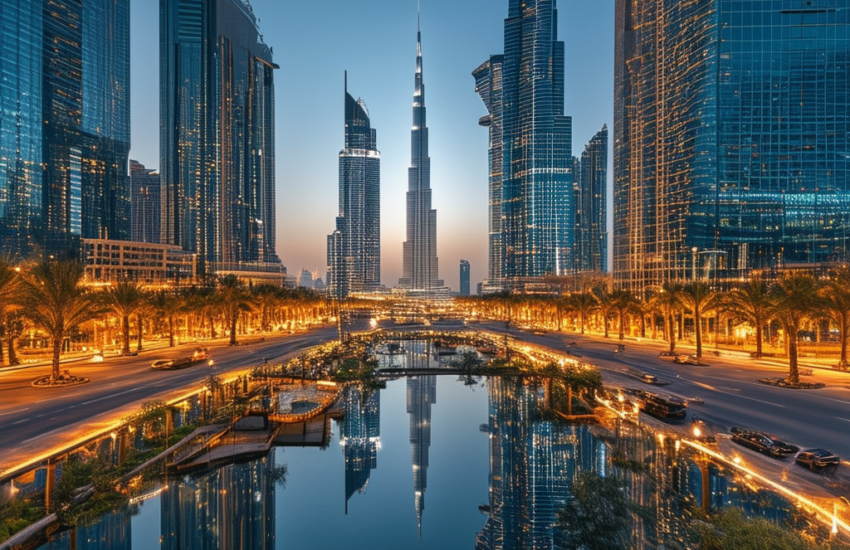The UAE’s technology sector witnessed a remarkable 42% growth in startup funding in 2023, reaching $1.8 billion in investments across emerging technology ventures. As the Middle East and North Africa’s premier technology hub, the UAE has established itself as the region’s undisputed leader in digital innovation, hosting over 50% of MENA’s technology startups.
This comprehensive guide explores the most strategic free zones for technology startups in 2024, offering entrepreneurs detailed insights into establishing their ventures in the UAE’s thriving digital ecosystem.
Understanding UAE Free Zones
Free zones represent specialized economic districts that serve as the backbone of the UAE’s entrepreneurial ecosystem. These purpose-built jurisdictions operate under their own regulatory frameworks, offering technology companies unprecedented autonomy and flexibility in business operations.
Within these zones, tech startups benefit from 100% foreign ownership, complete repatriation of profits, and significant tax advantages including zero corporate and personal income tax for 50 years. These benefits extend beyond mere financial incentives, as free zones create concentrated ecosystems where technology companies can thrive through strategic proximity to potential clients, partners, and investors.
The strategic significance of these zones lies in their ability to provide tech companies with immediate access to established digital infrastructure, specialized talent pools, and industry-specific resources. For tech startups, free zones represent more than mere business districts – they embody comprehensive ecosystems designed to nurture innovation and scale-up operations.
They provide streamlined licensing processes, simplified visa procedures, and dedicated support services specifically designed for technology companies, helping tech startups reduce operational complexities while accelerating their path to market.
Top Free Zones for Tech Ventures
Dubai Internet City (DIC)
As Dubai Internet City celebrates its 25th anniversary in 2024, it continues to strengthen its position as the Middle East’s largest technology hub. Housing over 29,000 technology professionals and more than 1,600 companies, DIC offers an unparalleled ecosystem for tech startups.
The free zone provides state-of-the-art infrastructure including high-speed fiber optic networks, smart office solutions, and dedicated innovation centers. Startup licensing packages start from AED 50,000, with the entire setup process typically completed within 3-4 weeks, making it an efficient entry point for technology ventures.
The free zone’s infrastructure represents a significant investment in fostering technological innovation, featuring advanced telecommunications networks and dedicated data centers. Companies benefit from robust fiber-optic connectivity, uninterrupted power supply, and smart building systems designed specifically for technology operations. The in|5 Tech innovation center provides additional support through specialized laboratories, testing facilities, and collaborative workspaces.
The networking advantages within DIC create unparalleled opportunities for business growth. Regular industry events, technology conferences, and networking sessions facilitate connections with potential clients, partners, and investors. The free zone’s proximity to Dubai Media City and Dubai Knowledge Park creates a comprehensive business ecosystem, enabling cross-industry collaboration and innovation.
This integrated environment positions companies within a robust framework for regional expansion and global market access.
Dubai Silicon Oasis (DSO)
Dubai Silicon Oasis distinguishes itself through its integrated technological ecosystem, combining industrial, commercial, and residential components. The free zone houses the Dubai Technology Entrepreneur Campus (Dtec), offering specialized facilities for tech startups including R&D laboratories, prototype development centers, and testing facilities.
DSO’s technopreneur program provides early-stage startups with comprehensive support, including mentorship, networking opportunities, and access to venture capital networks, with setup costs starting from AED 45,000.
At the heart of DSO’s offering is Dtec, the largest tech hub and coworking space in the MENA region. This purpose-built facility provides entrepreneurs with flexible workspace solutions, from hot desks to custom office spaces, alongside dedicated labs for prototype development and testing. The infrastructure includes specialized clean rooms for semiconductor research, advanced testing facilities, and modern conference centers equipped with the latest audiovisual technology.
The Silicon Oasis Founders (SOF) program stands as DSO’s flagship initiative for technopreneurs. This comprehensive incubation program provides early-stage startups with seed funding up to AED 500,000, mentorship from industry experts, and access to a network of venture capitalists and angel investors.
Participants receive specialized training in areas such as artificial intelligence, blockchain, and IoT implementation, while gaining access to DSO’s partnership network including major technology corporations and research institutions.
Abu Dhabi’s Hub71
Hub71 represents Abu Dhabi’s flagship tech ecosystem, offering startups access to its AED 246,800 Incentives Fund program. This transformative program provides qualified startups with substantial financial support covering housing, office space, and health insurance for up to three years, effectively reducing operational costs during crucial growth phases.
The free zone has established strategic partnerships with major global technology companies including Microsoft, Amazon Web Services, and Intel, providing startups with direct access to advanced technical resources and mentorship opportunities. These collaborations extend beyond mere networking, offering startups preferential access to cloud credits, development tools, and specialized training programs valued at over USD 400,000.
Hub71’s startup support framework operates through a three-tiered system, catering to ventures at different growth stages. The Value Creation Program connects founders with Abu Dhabi’s corporate and government entities, facilitating pilot projects and commercial opportunities. The Hub71 Accelerator Program, developed in partnership with Techstars, provides intensive 12-week acceleration cycles focusing on rapid scaling and market penetration.
Additionally, the Corporate Innovation Program bridges the gap between established corporations and startups, fostering mutually beneficial partnerships and potential investment opportunities.
Specialized Free Zones
DIFC for Fintech
The Dubai International Financial Centre has emerged as the region’s premier destination for fintech startups, operating under a sophisticated regulatory framework aligned with international standards. The DIFC’s Independent Financial Services Regulator (DFSA) has implemented a comprehensive fintech-focused regulatory regime that includes specialized licenses for payment services, digital banking, and blockchain-based financial services, making it particularly attractive for fintech startups seeking regulatory clarity.
At the heart of DIFC’s fintech ecosystem is the DIFC FinTech Hive, the region’s first and largest financial technology accelerator. The program offers participants access to over 60 financial industry partners, including leading global banks, insurance companies, and financial institutions. Selected startups receive mentorship, workspace access, and potential funding opportunities through the DIFC’s $100 million FinTech Fund, which has already supported numerous innovative ventures in areas like digital payments, RegTech, and Islamic FinTech.
The success of DIFC’s fintech initiatives is evident in its growing roster of breakthrough companies. Notable success stories include Sarwa, which has revolutionized digital wealth management in the region and secured over $15 million in funding, and BitOasis, which has become one of the Middle East’s leading cryptocurrency platforms. Complementing these advantages, DIFC offers fintech startups an Innovation Testing License (ITL), allowing them to test innovative solutions in a controlled environment before full market launch.
ADGM for Innovation
Abu Dhabi Global Market distinguishes itself through its comprehensive RegLab initiatives and digital banking frameworks. ADGM has established itself as a pioneering regulatory environment for financial innovation through its comprehensive RegLab program, which provides a controlled testing environment where fintech firms can develop and validate innovative solutions under relaxed regulatory requirements while maintaining appropriate consumer safeguards.
ADGM’s digital banking framework represents one of the most sophisticated approaches to digital financial services in the MENA region. The framework encompasses virtual banking licenses, digital payment services, and open banking initiatives.
Financial institutions operating under this framework benefit from a comprehensive regulatory environment that addresses key aspects of digital banking including customer onboarding, data protection, and cybersecurity requirements.
The ADGM sandbox program has emerged as a crucial platform for testing innovative financial solutions. Participants receive a temporary financial services permission, typically valid for two years, allowing them to develop and test their solutions with real customers under controlled conditions. The program has facilitated the testing of various technologies including AI-driven compliance solutions, blockchain-based payment systems, and automated investment platforms.
Success metrics from the sandbox program indicate a high rate of graduation to full licensing, with several participants successfully scaling their operations across the UAE and broader region.
Making the Right Choice
Selecting the optimal free zone for your tech startup requires a systematic evaluation across multiple dimensions. The decision framework below will help you assess your options based on key strategic factors that impact long-term success.
Business Activity Alignment
Different free zones specialize in specific business activities and offer varying levels of licensing flexibility. Dubai Internet City excels for software development and IT services, while DIFC provides specialized frameworks for fintech operations. Consider whether your primary business activity aligns with the free zone’s focus and whether you’ll need multiple license types as you expand. Evaluate if the free zone’s regulatory environment supports your specific technology vertical and planned service offerings.
Budget Analysis
Initial setup costs vary significantly across free zones, with premium locations commanding higher fees. Here’s a comparative analysis of key costs:

Infrastructure Requirements
Your technology infrastructure needs should align with the free zone’s offerings. Dubai Internet City provides robust digital infrastructure with redundant connectivity and advanced data centers. Dubai Silicon Oasis offers specialized R&D facilities and testing laboratories. Consider your requirements for server rooms, technical support, and digital infrastructure. Evaluate the quality and reliability of internet connectivity, power supply, and backup systems critical for tech operations.
Growth Trajectory Planning
Your expansion strategy should inform your free zone selection. Hub71’s incentive programs support rapid scaling, while DIFC’s established ecosystem facilitates international market access. Consider factors like:
- Scalability of office space
- Access to venture capital and investor networks
- Availability of skilled talent pool
- Proximity to target markets
- Ecosystem partnerships and collaboration opportunities
The ideal free zone choice emerges from careful evaluation of these factors against your startup’s specific needs and long-term objectives. Premium locations offer established ecosystems but require higher investment, while emerging free zones provide cost advantages and growth incentives but may have developing infrastructure. Your decision should balance immediate operational needs with future growth requirements.
Future Outlook
The UAE’s technological landscape is poised for transformative growth through 2030, with free zones playing a pivotal role in the nation’s digital evolution. The government’s UAE Digital Economy Strategy aims to double the digital economy’s contribution to GDP from AED 140 billion to AED 280 billion by 2031, positioning tech-focused free zones as crucial enablers of this vision.
Free zone authorities are actively developing specialized innovation districts and regulatory frameworks to support emerging technologies. Dubai Internet City has unveiled plans for a AED 4 billion expansion focused on artificial intelligence and quantum computing facilities, while ADGM is establishing a comprehensive Web3 ecosystem through its Digital Assets Framework 2.0. These initiatives directly support the UAE’s National Innovation Strategy, which targets positioning the nation among the world’s top 10 innovation leaders by 2030.
The integration of blockchain technology across free zones is accelerating, with DIFC and ADGM developing specialized blockchain valleys to host distributed ledger technology (DLT) startups. These hubs will offer enhanced licensing options for decentralized finance (DeFi) projects, NFT platforms, and blockchain development companies, complementing the UAE Blockchain Strategy 2021-2025 which aims to transition 50% of government transactions to blockchain platforms.
Artificial intelligence represents another pivotal focus area, with free zones implementing AI-driven smart services and dedicated zones for AI research and development. Hub71’s upcoming AI Center of Excellence will provide startups with access to advanced computing resources, while Dubai Silicon Oasis is expanding its AI and robotics labs to support deep tech ventures. These developments align with the UAE’s National Strategy for Artificial Intelligence 2031, which aims to establish the UAE as a global AI leader.
The metaverse and Web3 technologies are receiving substantial support through new free zone initiatives. Dubai’s recently announced Metaverse Strategy aims to create 40,000 virtual jobs and add $4 billion to Dubai’s economy by 2030. Free zones are responding by developing specialized licenses for metaverse companies, virtual asset service providers, and Web3 startups, positioning the UAE at the forefront of the next digital revolution.

